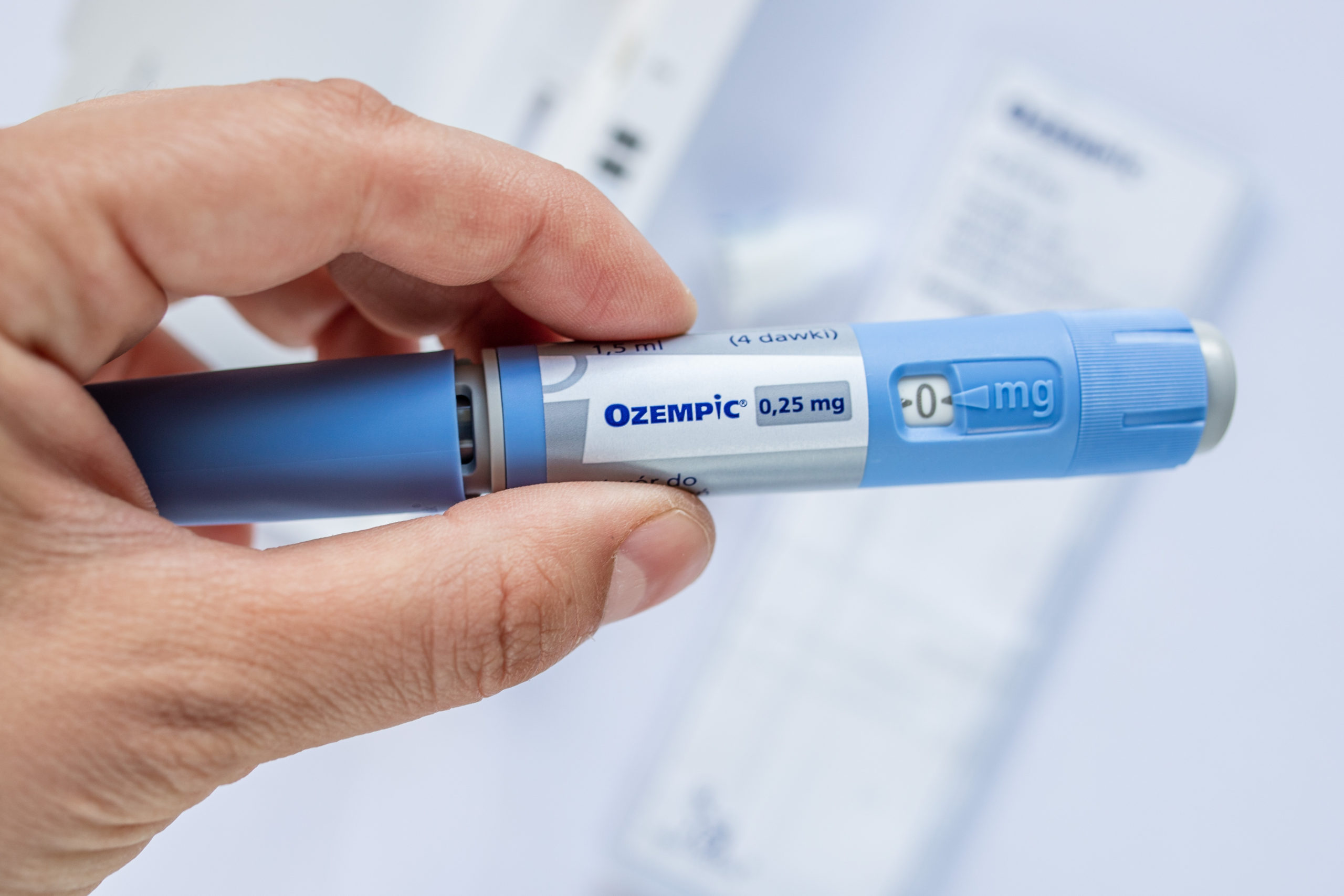
UP TO 40% OFF SITEWIDE






Is Ozempic better than metformin for weight loss?


Table of Contents
- Understanding Ozempic and Metformin
- Ozempic and Its Functions
- Metformin and Its Functions
- A Closer Look at Drug Administration
- Dosage and Method of Administration
- Mechanism of Action
- The Prescription Considerations
- SugarMD Advance Glucose Support
- Safety and Side Effects
- Weight Loss Efficiency: A Comparison Between Ozempic and Metformin
- Economic Considerations: Ozempic and Metformin
- Conclusion
- About The Author
Let's dive into the fascinating realm of pharmacology, where an intriguing tussle is taking place. Two drugs, Ozempic and Metformin, initially crafted with diabetes in mind, are garnering attention for their unintended effects on weight management. Weight loss - a struggle that continues to plague millions - has found potential allies in these medicines.
This article attempts to aswer the question that Is Ozempic better than metformin for weight loss? And dissect their unique qualities, compare their efficacy, and scrutinize the safety they offer in steering individuals towards a healthier weight.
Understanding Ozempic and Metformin
Ozempic and Its Functions
Novo Nordisk, a pharmaceutical titan, has graced the market with Ozempic. What is the secret behind its effectiveness, you ask? The answer lies in semaglutide, the active ingredient. This component is a master of disguise as it impersonates certain hormones in the body that regulate blood sugar. Its classification? A glucagon-like peptide 1 (GLP-1) agonist.
Now, Ozempic's role in the body is multifaceted. Imagine your body as a finely tuned orchestra. Ozempic is the skilled conductor, directing multiple sections to work in harmony. First, it prompts the body to produce more of its own insulin - the hormone that helps control the level of glucose in your blood. Its next move is to slow the journey of food from the stomach to the small intestines, a tactic that curbs the amount of glucose that enters your bloodstream after a meal.
However, Ozempic doesn't stop there. It steps into the liver's domain, reducing its glucose production. This action further helps to maintain healthier blood sugar levels. Lastly, this remarkable drug keeps a tight rein on appetite, encouraging less food intake. These effects, each playing their part, harmonize into a symphony that has a delightful side effect: weight loss.
The slowed digestion makes one feel fuller for longer, and reduced appetite prevents overeating. The result? A potential slimming effect that has sparked interest far and wide. It's a testament to the innovative thinking in pharmacology, where a drug designed to manage diabetes can show promising results in another crucial health area: weight management. It's worth noting, though, that any medication's effectiveness varies from person to person, and Ozempic is no exception. However, the combined mechanism of this drug certainly offers an intriguing approach to weight loss.
Metformin and Its Functions
In the world of medicine, metformin's reputation precedes it. This wonder drug is a mainstay on the prescription pads of healthcare providers around the globe. A mighty weapon in the medical arsenal, metformin primarily swings into action as the first line of defense against the pervasive menace known as type 2 diabetes. Diving into its functionality, metformin boosts insulin sensitivity at the cellular level. This crucial aspect cannot be overstated.
When insulin sensitivity is enhanced, cells can drink in more sugar. This, in turn, allows them to put that sugar to work with an efficiency that would make a Swiss watchmaker green with envy. The upshot? An overall improvement in the body's blood sugar management. In addition to this, metformin stages a strategic assault on the liver, one of the body's primary sugar factories. Under its influence, the liver's sugar production levels take a nosedive.
This is crucial because an overactive liver can sometimes churn out more sugar than the body needs or can handle, thereby keeping blood sugar levels in check. To cap it all, this pharmaceutical knight in shining armor throws a monkey wrench into the workings of the intestines, putting the brakes on their sugar absorption process. Much like a diligent border patrol agent, metformin ensures that not all incoming sugar makes it into the body's system.
Now, let's draw a comparison with another heavyweight on the drug market, Ozempic. It's interesting to note that Ozempic, too, has been found to be a cheerleader for weight loss in specific scenarios. And guess what? Metformin, too, pulls its weight in this department. When certain conditions are met, metformin can rally the troops and spearhead a weight-loss drive, which makes it an even more valuable addition to the medical toolkit.
A Closer Look at Drug Administration
Metformin, like many other medications, doesn't play favorites when it comes to administration routes. Typically, you'll find metformin parading as a tablet or in the guise of an oral solution. It happily adapts to the preferences and needs of the individual patient. Let's cast a glance at another contender in the pharmaceutical arena - semaglutide.
This drug, too, isn't fussy about its delivery method. Whether it's in the form of a pill or an injectable solution, semaglutide makes its way to the frontlines. However, it's worth mentioning a distinctive feature here. Not all brands of semaglutide are created equal. Take, for instance, the brand Wegovy.
It holds the distinctive honor of being one of the few brands that has secured the golden stamp of approval from the U.S. Food and Drug Administration (FDA) specifically for weight management. This lends an added layer of credibility to its standing and bolsters its reputation in the eyes of both medical professionals and patients.
Dosage and Method of Administration
Addressing the challenges posed by obesity requires careful deliberation and judicious selection of medication. Among the pantheon of weight-loss drugs, Semaglutide and Metformin have been notable for their efficacy. However, they differ significantly in their recommended dosages and methods of administration.
Semaglutide, a pharmaceutical heavyweight, has carved a niche for itself with a unique dosing schedule. Administered as a subcutaneous injection, it is typically given once a week. It's not a one-size-fits-all solution, though. Dosages vary based on patient needs, particularly focusing on those who are overweight or battling obesity. The regimen begins modestly, with a lower dose initially. Over time, it is systematically increased.
This incremental approach, akin to walking before you run, allows the patient's body to acclimatize gradually to the drug, reducing the risk of an adverse reaction. The narrative with Metformin is slightly more complex. Unlike Semaglutide, it does not come equipped with a definitive dosage recommendation for weight loss. Instead, it operates on a more flexible paradigm. Typically, the journey begins at a lower dose, similar to Semaglutide.
Yet, the crux lies in the customization: the dose is adjusted based on the individual patient's response. It's akin to fine-tuning a musical instrument until the notes sound just right. Each patient's body responds differently to medication, so this tailored approach ensures optimal benefits and minimal side effects.
Mechanism of Action
Drilling down into the biochemistry, the contrast between Semaglutide and Metformin becomes more apparent. They may both be players in the same arena, but they play by different rules. Semaglutide, on one hand, assumes the role of incretin hormones, a group of metabolic hormones that stimulate insulin secretion in the pancreas. It's like a conductor, encouraging the orchestra to play.
When introduced into the body, it stimulates the beta cells that contain GLP-1 receptors. These receptors are the gatekeepers, holding sway over glucose absorption. The end result? Blood glucose levels take a nosedive, maintaining an optimal balance. Metformin, a member of the biguanide class of drugs, orchestrates a different approach.
It targets the liver, the body's metabolic hub. With surgical precision, it activates specific enzymes responsible for glucose production, enhancing their efficiency. It's akin to turning up the volume on a quiet speaker. At the same time, it amplifies insulin sensitivity. It's a two-pronged attack, where it not only bolsters glucose production but also ensures its effective utilization.
The culmination of this process is improved glucose absorption by the liver, which in turn helps control blood sugar levels. Though Semaglutide and Metformin perform their roles differently, they are united by a common goal: optimizing the body's glucose management and aiding in weight loss. The choice between them hinges on several factors, including patient characteristics, tolerability, and physician recommendations. However, as with any medication, these drugs should be administered under the supervision of a healthcare professional to ensure their safe and effective use.
The Prescription Considerations
There's an array of medication options for managing diabetes, each offering different benefits and potential challenges. Two prominent choices, Metformin and Ozempic, offer unique advantages in controlling blood sugar levels, which is the heart of any diabetes management strategy. These two drugs function principally to regulate blood sugar.
Both have shown remarkable efficacy in substantially reducing average blood sugar levels, as indicated by the A1c blood test. This test provides a snapshot of your average blood glucose level over the past 3 months, thus offering a broader perspective on your blood sugar control. Metformin, when administered at its highest dosage, has the potential to diminish A1c by an impressive 1.5%. On the other hand, an average dose of Ozempic can decrease A1c by a near-equivalent 1.4%.
It's noteworthy that these results are contingent upon numerous factors, including the individual's overall health and adherence to prescribed doses. Imagine you're a patient already on Metformin, but you notice that its effects are plateauing, and it's not providing the optimal benefits you've come to expect. What's the next step? Healthcare providers may consider adding Ozempic to the mix.
Ozempic can either replace Metformin or be used concurrently as an adjunct therapy to amplify the blood sugar lowering effect. Now, let's consider another factor: weight loss. For many diabetes patients, managing weight can be a significant part of their treatment plan.
Here, Ozempic may edge out Metformin. Research shows that Ozempic may lead to more considerable weight loss compared to Metformin, making it a potentially attractive option if weight reduction is a priority.
SugarMD Advance Glucose Support
Maintaining healthy blood sugar levels can be a challenge. From carby meals to snacks and even with all the effort, it’s still not enough. That’s where SugarMD Advanced Glucose Support comes in. Our blend of traditional Ayurvedic herbs helps regulate blood sugar levels, curbs cravings, supports weight loss, boosts metabolism and energy. Endorsed by endocrinologists, this unique formula of pure, potent herbs promotes overall blood sugar health. Ideal for both pre-diabetics and Type 2 diabetics.
Safety and Side Effects
Delving into any medication, it's crucial to consider the potential side effects. After all, effective treatment is about more than just managing symptoms—it's about improving overall quality of life. For some, Ozempic may trigger certain side effects, the most frequent of which include nausea, vomiting, diarrhea, and abdominal pain. Some people may also experience constipation. A noteworthy side effect is a diminished appetite, which, while potentially uncomfortable, can also contribute to the weight loss mentioned earlier.
As for Metformin, its common side effects are quite similar to those of Ozempic. They commonly encompass diarrhea, nausea, and an upset stomach. Some patients might also experience an unusual metallic taste in the mouth. An infrequent but severe potential side effect is lactic acidosis, a risky condition particularly for those with kidney issues. There's another shared side effect between the two drugs: hypoglycemia, characterized by abnormally low blood sugar levels.
This condition can be particularly precarious when these medications are taken alongside other diabetes treatments. Before starting any new medication, it's of utmost importance to discuss these potential side effects with your healthcare provider.
Understanding what to expect can help you weigh the benefits against the risks and make an informed decision about your diabetes management plan. Remember, effective treatment isn't one-size-fits-all, and what works best will depend on your unique situation.
Weight Loss Efficiency: A Comparison Between Ozempic and Metformin
When it comes to managing weight, medications can serve as viable tools. It's interesting to note that not all medications are created equal in this regard. Specifically, we're putting Ozempic and Metformin under the lens today. Both are potent allies in the quest for weight loss. However, they showcase differences in the magnitude of their impacts.
Diving into the world of research, it's apparent that Ozempic has made a significant splash in weight loss studies. The evidence is strong and consistent. Clinical trials have unveiled a considerable potential for weight reduction, tied to the usage of Ozempic. Remarkably, those who participated in these studies experienced a weight loss that ranged between 5-10% of their original weight. And this happened over a period of 26 to 52 weeks. It's impressive, isn't it? But hold onto your hats, folks - for some people, the effect was even more pronounced.
Certain patients witnessed up to 15% reduction in their initial body weight. This makes Ozempic a powerhouse in the weight loss medication arena. However, let's not dismiss Metformin. It might not steal the show like Ozempic, but it has its own merits. True, Metformin's effects on weight loss are generally not as dramatic as those of Ozempic. For many people, Metformin leads to a weight loss hovering around 2-3% of their initial weight.
Yet, it would be a mistake to underestimate this drug. Here's a surprising fact - Metformin shows a unique strength in a particular area. It is proficient at averting the weight gain often associated with the use of antipsychotic medications. So, while its power in causing weight loss may not be overwhelming, Metformin does play a crucial role in weight management.
Economic Considerations: Ozempic and Metformin
Speaking of differences between Ozempic and Metformin, it's necessary to address the elephant in the room - the cost factor. Medications are an investment, and it's crucial to evaluate the monetary aspects when selecting a weight management plan. And, there's a considerable disparity between Ozempic and Metformin in this respect. Ozempic, despite its impressive weight loss efficacy, comes with a hefty price tag.
Without the safety net of insurance, Ozempic can burden one's pocket with a cost that goes up to $850 per month. It's a significant sum, making it a substantial consideration for many. On the flip side, Metformin shines with its affordability. Its price tag is relatively low when contrasted with Ozempic. The monthly cost of Metformin, typically, doesn't exceed $50. This puts it within the reach of many more individuals.
Thus, it's clear that finances might tip the balance when choosing between these two potent medications. To summarize, both Ozempic and Metformin offer valuable help in weight management, albeit with different levels of impact. Their cost, however, varies greatly, which is a crucial aspect when considering a long-term medication plan. Thus, choosing between them involves evaluating one's specific needs, financial capabilities, and desired weight loss outcomes.
Conclusion
Having undertaken an enlightening journey through the inner workings of two commonly used weight loss drugs, Ozempic and Metformin, we find ourselves equipped with the necessary knowledge to draw conclusions about their strengths and drawbacks. Ozempic and Metformin, while often viewed as parallel options in the battle against excess weight, are vastly different in terms of their effectiveness, cost, and side effects.
On one end of the spectrum, we encounter Ozempic, widely recognized for its superior effectiveness in aiding weight loss. Research abounds, attesting to Ozempic's high potency in shedding those stubborn pounds, offering a ray of hope to those struggling with obesity. Its unique mechanism of action targets key processes in the body, stimulating weight loss in a way that leaves many of its competitors behind. However, this enhanced efficiency comes at a cost.
Quite literally so, as Ozempic is notorious for its relatively high price tag. To add to that, it carries the potential for a wider array of side effects, thus warranting a thorough discussion with your healthcare provider before deciding to embark on an Ozempic regimen. Contrastingly, Metformin presents itself as a more wallet-friendly alternative. With a significantly lower price point, Metformin is an accessible choice for a broader spectrum of individuals. Besides, it boasts a lengthy safety record, built over years of usage and extensive studies, lending credence to its claim of being a reliable weight loss aid.
Nonetheless, it's crucial to mention that Metformin's efficacy in promoting weight loss, though proven, may not be as potent as Ozempic. This contrast underscores the fundamental concept that every medication has its unique set of benefits and challenges. In conclusion, navigating the journey towards a healthier weight may seem daunting, but with the right tools and information, it's certainly achievable. The choice between Ozempic and Metformin hinges on an array of factors, including their effectiveness, cost, potential side effects, and your unique circumstances. Each medication brings something different to the table, and understanding these differences is the first step towards making an informed decision.
About The Author
Meet Dr. Ahmet Ergin a highly skilled and dedicated endocrinologist with a passion for diabetes care. Dr. Ergin earned his medical degree with honors from Marmara University in Istanbul. He completed internal medicine residency and endocrinology fellowship at Cleveland Clinic.
Dr. Ergin is board-certified in Internal Medicine, Endocrinology, Diabetes, and Metabolism due to his vast medical expertise. He's a certified diabetes educator, author of "The Ultimate Diabetes Book," and founder of "the SugarMD YouTube channel." Dr. Ergin offers exceptional diabetes care to his patients in Port Saint Lucie, FL, helping them manage effectively.
Disclaimer: These statements have not been evaluated by the Food and Drug Administration. Information on this website isn’t intended to treat, cure or prevent any disease. Discuss with your doctor and do not self-treat.
Written By Dr. Ahmet Ergin
466 total articles
Meet Dr. Ahmet Ergin, a highly skilled and dedicated endocrinologist with a passion for diabetes care. Dr. Ergin earned his medical degree with honors from Marmara University in Istanbul. He completed internal medicine residency and endocrinology fellowship at Cleveland Clinic. Dr. Ergin is board-certified in Internal Medicine, Endocrinology, Diabetes, and Metabolism due to his vast medical expertise. He's a certified diabetes educator, author of “The Ultimate Diabetes Book,” and founder of “the SugarMD YouTube channel.” Dr. Ergin offers exceptional diabetes care to his patients in Port Saint Lucie, FL, helping them manage effectively. For a closer look into his insights and experiences, connect with Dr. Ahmet Ergin on LinkedIn, Instagram, and YouTube.”
Disclaimer: These statements have not been evaluated by the Food and Drug Administration. Information on this website isn't intended to treat, cure or prevent any disease. Discuss with your doctor and do not self-treat.
Products















